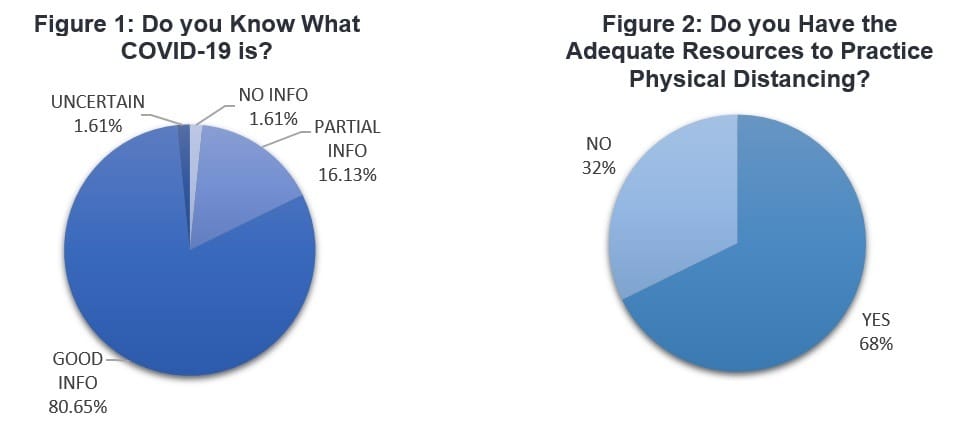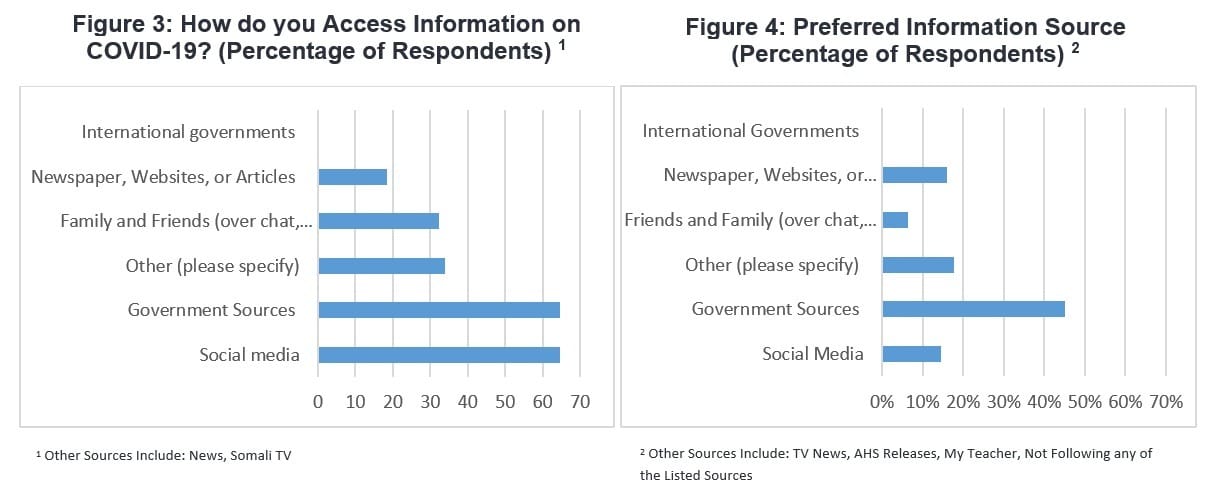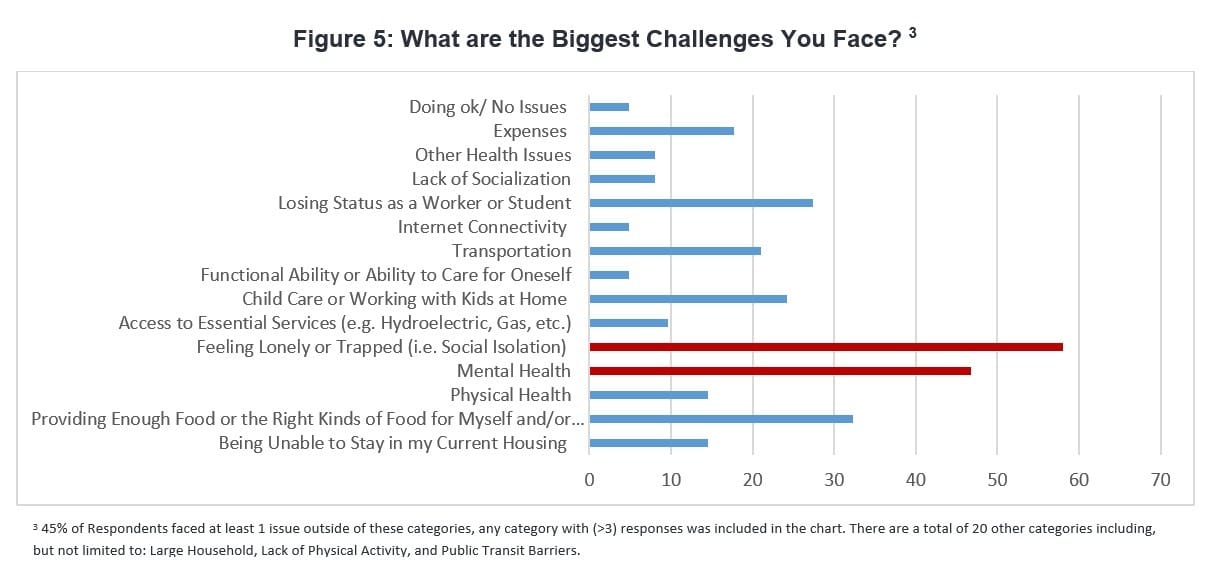Introduction
When lockdowns began as a result of the COVID-19 pandemic in March 2020, Islamic Family and Social Services Association (IFSSA) partnered with the Edmonton Social Planning Council (ESPC) to deliver a survey on the needs of clients in the social services sector.
Working collaboratively, ESPC and IFSSA prepared survey questions jointly and conducted the survey through Survey Monkey with translation and data collection support from a team of IFSSA volunteers. Overall, 68 respondents replied to the survey, 6 responses were removed from the analysis because they did not wish to be in the summary, making a total of 62 respondents for this report.
Findings

What Does This Mean?
While just under 20% of respondents had partial knowledge, no knowledge, or an uncertain amount of knowledge on COVID-19, 32% did not have the resources required to practice physical distancing. This means that there are clients who are knowledgeable about how to protect themselves from COVID, but still struggle to be able to follow the restrictions due to other barriers of access.

What Does This Mean?
Though just over 45% of respondents claim their preferred information source is government sources, in actuality respondents are equally consuming information from social media sources and government sources, alongside friends and family and other Sources like home language news channels on television.
This provides valuable insights for Governments and other non-profit agencies looking to communicate information to Islamic community members. One important piece of information is that it can be useful to have mixed-media sources for providing information. It is also essential to consider that social media sources could include sources like YouTube videos in the native languages of participants. This means if governments and other agencies wish to share information that will reach migrant clients, it can be beneficial to ensure that translated information is available in an auditory format so that people can listen to the information if they are unable to read.

What Does This Mean?
Currently, the top challenges for IFSSA clients are feeling lonely and trapped (58%) as well as mental health concerns (47%). These results call into focus the desperate need for mental health supports and access for clients, and are particularly telling due to the fact that for many of IFSSA’s clients the topic of mental health can be taboo. These results also call into question whether agencies have been over-focusing on food security as a primary concern rather than looking at the complete resources clients would need to face the challenges of the pandemic. While it is indeed possible that protective actions early in the pandemic have allowed food access to be less of a concern now at 32%, it is also an important call to both agencies and funders to look to be more flexible and adaptive in their services, as well as to give a keen focus towards mental health resourcing and social supports as a core part of their services moving forward.
Conclusions
This study brought forward key issues such as the importance of increasing mental health access for marginalized communities, reconsidering communication strategies from governments towards immigrant demographics, and ensuring we look at the holistic picture of clients when designing supports. The original hope for the research was that it could be done across Edmonton with shared questions throughout the social services sector to better understand the pandemic and emerging issues for clients as they arose. While the survey was carried forward this time solely by IFSSA, there is hope in the future for cross-agency cooperation on research. If you are from a social services agency and would like to partner in future research projects, please contact Omar Yaqub at omary@islamicfamily.ca.
[/et_pb_text][/et_pb_column][et_pb_column type=”1_4″ _builder_version=”4.7.4″ custom_padding=”0px|20px|0px|20px|false|false” border_color_left=”#a6c942″ custom_padding__hover=”|||”][et_pb_testimonial author=”Posted by:” job_title=”@ET-DC@eyJkeW5hbWljIjp0cnVlLCJjb250ZW50IjoicG9zdF9hdXRob3IiLCJzZXR0aW5ncyI6eyJiZWZvcmUiOiIiLCJhZnRlciI6IiIsIm5hbWVfZm9ybWF0IjoiZGlzcGxheV9uYW1lIiwibGluayI6Im9uIiwibGlua19kZXN0aW5hdGlvbiI6ImF1dGhvcl93ZWJzaXRlIn19@” portrait_url=”@ET-DC@eyJkeW5hbWljIjp0cnVlLCJjb250ZW50IjoicG9zdF9hdXRob3JfcHJvZmlsZV9waWN0dXJlIiwic2V0dGluZ3MiOnt9fQ==@” quote_icon=”off” portrait_width=”125px” portrait_height=”125px” disabled_on=”on|off|off” _builder_version=”4.7.7″ _dynamic_attributes=”job_title,portrait_url” _module_preset=”default” body_text_color=”#000000″ author_font=”||||||||” author_text_align=”center” author_text_color=”#008ac1″ position_font=”||||||||” position_text_color=”#000000″ company_text_color=”#000000″ background_color=”#ffffff” text_orientation=”center” module_alignment=”center” custom_margin=”0px|0px|4px|0px|false|false” custom_padding=”32px|0px|0px|0px|false|false”][/et_pb_testimonial][et_pb_text disabled_on=”on|off|off” _builder_version=”4.7.7″ _dynamic_attributes=”content” _module_preset=”default” text_text_color=”#000000″ header_text_align=”left” header_text_color=”rgba(0,0,0,0.65)” header_font_size=”20px” text_orientation=”center” custom_margin=”||50px|||” custom_padding=”48px|||||”]@ET-DC@eyJkeW5hbWljIjp0cnVlLCJjb250ZW50IjoicG9zdF9jYXRlZ29yaWVzIiwic2V0dGluZ3MiOnsiYmVmb3JlIjoiUmVsYXRlZCBjYXRlZ29yaWVzOiAgIiwiYWZ0ZXIiOiIiLCJsaW5rX3RvX3Rlcm1fcGFnZSI6Im9uIiwic2VwYXJhdG9yIjoiIHwgIiwiY2F0ZWdvcnlfdHlwZSI6ImNhdGVnb3J5In19@[/et_pb_text][/et_pb_column][/et_pb_row][/et_pb_section]
